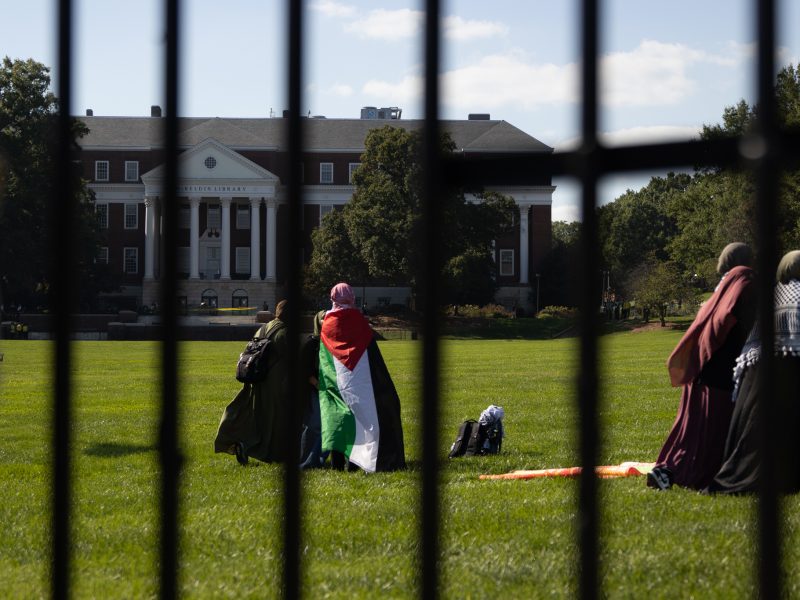
Shot of students watching a live stream of Maryland’s Constitution Day.
Three former clerks to Supreme Court justices joined university students in a forum Wednesday on the 227th anniversary of the Constitution’s signing to discuss their experience with the Supreme Court and its role in our democratic society.
The event, titled UMD Constitution Day, took place at the UM Francis King Carey School of Law at the University of Maryland, Baltimore. About 25 students traveled to participate in the forum, while more than 50 watched a live stream on this campus at the Computer Science Instructional Center.
Thiru Vignarajah, former clerk to Justice Stephen Breyer talked about how Breyer believes the Supreme Court should be hesitant to strike down acts of Congress, except in extreme circumstances.
“[Breyer] says … if a state’s representatives, who have been elected by the people, or the federal government’s representatives, who have been elected by citizens across the country, come together and decide that this is the law that they want, it should be an exceptional act by [The Supreme Court] to strike that kind of thing down,” Vignarajah said. “We should always remember that our North Star is allowing the people to govern themselves.”
Rebecca Taibleson, former clerk to Justice Antonin Scalia, said Scalia has a firm methodology he uses to make sure he stays consistent with his principles and remains legitimate in the eyes of the public.
“Certainly it’s difficult on a case-to-case basis but he wants a stable guide post to keep him honest,” Taibleson said about Scalia. “He’s very keenly aware that he’s not elected and he’s been appointed for life and none of us had any choice about him really and have any choice about if he stays.”
The panelists also gave advice to the undergraduate and law school students watching the forum. Associate Dean Max Stearns, the debate moderator, said he had law school students from “tremendously varied” undergraduate majors and that students shouldn’t worry about their major’s relation to law.
“The most important thing is to find the thing that excites you and pursue it vigorously,” he said. “That’s really what you’re going to take to law school: that level of attention to detail, broad understanding, intellectual curiosity and drive, that’s what matters.”
Vignarajah said his best piece of advice to undergraduate students is to practice writing and find confidence in their voice, a skill he said he wished he developed earlier.
Junior government and politics major Mickey Hartz, who watched the live stream from the campus, said he is considering law school and found the forum valuable.
“It really gave me some good perspective about what my goals should be both academically and as a person,” Hartz said. “Not just to get a good grade but to aspire to be somewhat like these people.”
Brandee Pettus, assistant director of the law and society minor at this university, helped organize the event and said she hoped the event would spark greater student interest in law.
“Seeing and observing someone who clerked for the Supreme Court for someone interested in the law is a huge benefit,” she said. “It will either strengthen their interests in law or see personalities like the man behind the justice.”


